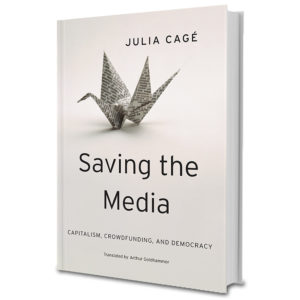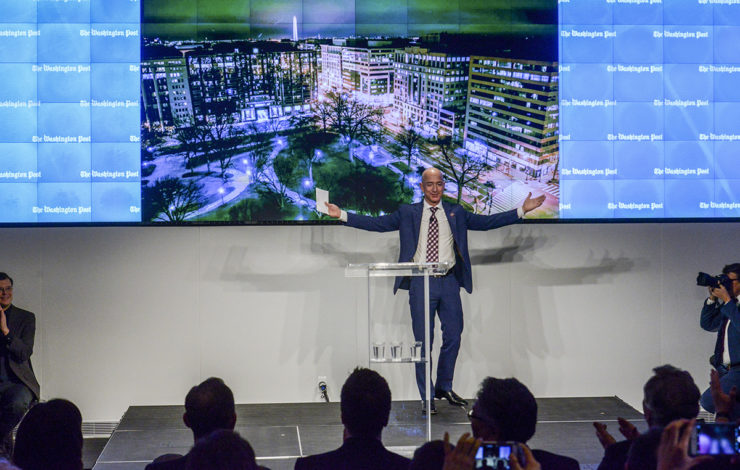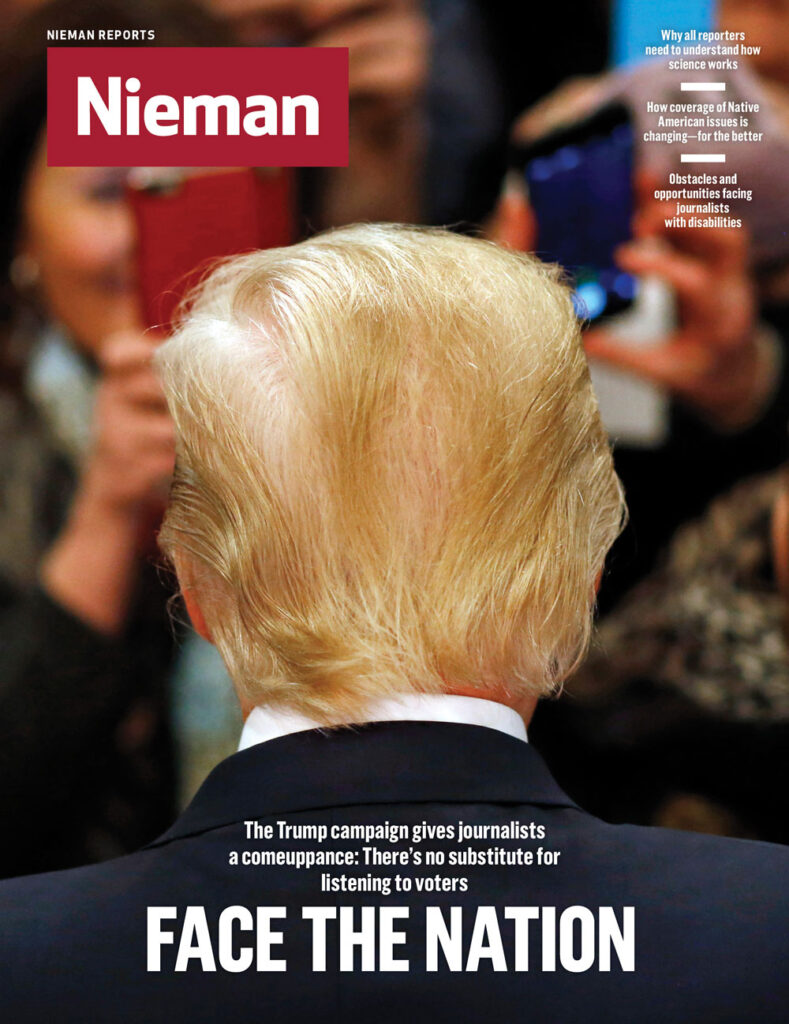“There have never been as many information producers as there are today. Paradoxically, the media have never been in worse shape,” economics professor Julia Cagé writes in her book “Saving the Media: Capitalism, Crowdfunding, and Democracy,” published by Harvard University Press in April. In it, she proposes a new business model for news organizations, inspired by a central idea: that news, like education, is a public good. Her model is inspired in part by major universities that combine commercial and nonprofit activities. A number of U.S. publications are organized as nonprofits but Cagé advocates a change in tax rules and the stable provision of capital through long-term investments to give news organizations more flexibility while also decentralizing control. Cagé, who holds a doctorate in economics from Harvard University, is an economics professor at the Paris Institute of Political Studies. She is a board member of Agence France Presse and a member of the Council of Economic Advisors to France’s finance minister. This excerpt has been adapted from her book, which was translated from French by Arthur Goldhammer:
Some observers argue that the media themselves are responsible for the worrisome situation they find themselves in because of their many mistakes and their failure to adapt to the new world. My diagnosis is somewhat different: the media have not hit on the right economic model because they have failed to comprehend the nature of the crisis and therefore continue to react with outdated reflexes. Most debate is focused on “the death of print,” but what matters is not the medium but the message. The most important issues of quality content and the organizational structure of the media have been neglected.

In short the question is not whether the media should be subsidized. It is rather whether they should be granted a favorable legal and tax status in recognition of their contribution to democracy—a status comparable to that long enjoyed by many other participants in the knowledge economy. Some see the interest of billionaire investors such as Jeff Bezos, Pierre Omidyar, and John Henry as the harbinger of a new golden age: once again, newspapers will be flush with resources and staff.
But if the media of the future must depend on wealthy investors for their financing, many dangers lie ahead. It was in part the settlement of the estate of the Italian publisher Carlo Caracciolo that plunged the newspaper Libération into the crisis in which it finds itself today. That is why it is preferable for media companies to be organized as foundations rather than joint-stock companies: in a foundation, heirs cannot dispose freely of capital they inherit. The investment is irrevocable, hence permanent.
With many news outlets now mired in crisis, it has become imperative to think of new models for the media. The one I propose is based on crowdfunding and power-sharing. I hope that it may serve as a new economic and legal template for the media of the 21st century, a template that combines aspects of both a joint-stock company and a foundation. Let us call this new entity a nonprofit media organization (NMO).
To begin, it is useful to recall some mistakes of the past, starting with the experience of newspapers that have become publicly held corporations. Going public proved to be a mistake both for the newspapers themselves and for democracy. In the first five years after the Chicago Tribune went public, profits rose at the rate of 23 percent per year while gross revenue increased at a rate of only 9 percent; this performance was achieved by slashing expenditures drastically. The drive for higher profits affected not just newspapers but radio and television outlets as well (some television stations have operating margins above 50 percent), and the imperative to produce quality local news fell by the wayside.
To put it bluntly, shares of news media companies should not be publicly traded. This is particularly true in the United States, where publicly held companies have a fiduciary responsibility to their stockholders to maximize profits. This legal obligation conflicts with their moral responsibility to “serve the general welfare” (as indicated in the Statement of Principles of the American Society of News Editors). Similarly, because universities have a moral responsibility to educate and engage in research, it is hard to imagine them as publicly traded profit-maximizing corporations.
Being a nonprofit hasn’t impeded the growth of media conglomerate Bertelsmann
In the United States, the United Kingdom, Ireland, and Germany, newspaper companies have experimented with a variety of innovative formulas over many years. Many nonprofit media organizations have emerged. In Germany the largest media conglomerate, Bertelsmann—number one in Europe and one of the largest media companies in the world—is owned by the Bertelsmann Foundation. This structure has in no way impeded Bertelsmann’s growth. Bertelsmann, with 110,000 employees, occupies a significant place in the media landscape in France, in Europe, and in the United States, where it is the majority shareholder in Penguin Random House, the largest publishing house in the world.
Foundation status alone does not determine how media companies are governed. Should power be strictly proportional to shares of capital? If so, what countervailing powers can exist? In a typical joint-stock company, whoever owns the most shares also has the lion’s share of the voting rights. This is a problem, because a dominant shareholder can see to it that the company serves his or her own economic or political agenda rather than the public interest.
Let’s survey some existing models of nonprofit media organizations to gain a better idea of their advantages and limitations. One of the oldest independent foundation-owned newspapers is The Guardian, a pillar of the British press. The Guardian is owned by the Guardian Media Group, which is itself entirely controlled by the Scott Trust, a nonprofit foundation whose mission since 1936 has been to safeguard the paper’s independence. In France, Ouest-France, the leading daily in terms of circulation, has been owned by a nonprofit organization since the early 1990s. With this legal status, the newspaper was able to avoid a hostile takeover.
However, it is in the United States, where philanthropy reigns supreme, that we find the largest number of nonprofit media organizations. One of the best-known is ProPublica, which Herbert and Marion Sandler created in 2008 with a donation of several million dollars. The investigative journalism site has already won two Pulitzer prizes. Among the more successful ventures we find are the Tampa Bay Times, which is owned by the nonprofit Poynter Institute; The Texas Tribune, The Christian Science Monitor, and of course the Associated Press, one of the world’s leading press agencies and oldest cooperatives.
Can we say that the nonprofit form is the solution to the current crisis of the media? Notwithstanding the exceptional cases cited above, most nonprofit media companies are very small. Most of these organizations engage in niche journalism, specializing in narrowly defined subject areas.
Although such publications do bring welcome fresh air to democratic debate and to some extent fill the void left by cost cutting in the traditional media, they do not appear to be capable of substituting for existing newspapers, especially since most of them are pure Internet players, which suffer from the same weaknesses as newspaper websites. The average visit to the website of a nonprofit publication lasts fewer than two minutes, half the length of the average visit to the site of a traditional American paper and far less than the time spent reading a traditional print paper. These weaknesses are not intrinsically related to the foundation status of the organizations in question but are due in large part to inadequate capitalization.
Foundations deserve credit for putting readers back in the center of the picture … yet they have failed to involve readers in their financing. Except for the Voice of San Diego, which launched one of the largest-ever media crowdfunding campaigns (the Bigger Voice Fund), media companies have raised very little money via this route. Foundations generally favor large donations from wealthy individuals, firms, or other foundations over small individual contributions. This gives rise to two problems. First, they become vulnerable to excessive influence by a small number of individuals, thus creating a risk to democracy. And second, they become equally vulnerable to economic downturns and therefore financially fragile.
One other point deserves emphasis: the tax laws pertaining to foundations are extremely complex in both the United States and France, and this places strict limits on the development of foundation-based or other alternative media. In the United States, it is very difficult for a nonprofit news operation to meet the criteria of Section 501(c)3 of the tax code, which must be satisfied by any organization seeking to accept tax-exempt contributions and avoid payment of the corporate income tax.
French authorities are currently considering extending foundation status to media organizations, and it is to be hoped that this comes to pass. One possibility would be to declare the maintenance of press pluralism as a mission in the public interest. In any case, it is extremely important that we begin to think of the media as part of a much larger ecosystem, the knowledge-producing sector of the economy.
My point is not to propose specific improvements in French or American law. It is rather to argue that extending the tax breaks accorded to endowment funds in France and 501(c)3 organizations in the United States would mark a significant step forward. Simplification of the current system for contributions to the media would encourage private donations and make state aid more efficient. Even more important, reorganizing media companies as foundations would make it possible to establish permanent capital endowments. Gifts to foundations are irrevocable, and
a system of irrevocable investments would make it possible to guarantee the independence of media companies over the long run.
The type of nonprofit media organization I am proposing combines the virtues of different legal types. It enjoys the advantages of a foundation (stability of financing and ability to focus on information as a public good rather than on profit maximization at the expense of quality) and those of a joint-stock company (diversified ownership, replenishment of leadership ranks, and democratic decision-making, provided that the power of the largest shareholders is appropriately limited). The NMO I am proposing is a hybrid model. It is inspired in part by the model of the great international universities, which combine commercial and noncommercial activities.

The NMO model falls between the two extremes of a foundation and a joint-stock company. Like a foundation, it can accept unlimited gifts. In my model, such gifts are to be tax deductible, as gifts to foundations currently are. Yet they are also to be compensated by voting rights in the firm: a gift to an NMO is a contribution to its capital and therefore brings “political” rights like any other investment.
In countries like the United States, where existing media subsidies are insufficient, the NMO model could also provide a novel and extremely efficient way for the government to increase its contribution to the health of the media. The NMO model offers numerous advantages. It combines the benefits of the nonprofit model with democratized governance, bringing in more small shareholders while also allowing for the large investments that are often needed. Big investors give up some of their decision-making power but in return receive millions in tax breaks.
Tax relief in exchange for democratization and capital stabilization: this system resolves the inherent contradictions involved in giving subsidies to media owned by large profit-making corporations or in allowing the press to be controlled by individuals with deep pockets.
The solution I am proposing may seem radical. But this new legal entity of a NMO is not all or nothing. Drastic simplification of the existing system of press subsidies in France, a more accommodating legal and fiscal framework for the media in the United States, extension of the value-added tax reduction to online newspapers in Europe (where the tax break is currently available only to print newspapers), and, more generally, granting media companies everywhere easier access to foundation status and the benefits of private contributions—all of these measures would help.
Like universities, news media provide a public good and deserve a special status
What must be recognized is that the news media provide a public good, just as universities and other contributors to the knowledge economy of the twenty-first century do. For that reason they deserve special treatment by the government. Governments have moved gradually toward allowing media companies to operate as nonprofits and therefore to solicit donations. At the same time, they have made it too difficult to acquire nonprofit status because they have not fully embraced the idea that news is a public good.
In the current media landscape, it is not difficult to find any number of troubled organizations that could be saved if they adopted the NMO model. In France, for example, the NMO model would have allowed the employees of the regional daily Nice Matin (then in receivership) to buy the paper without having to cede ownership of Corse-Matin or delegate management of the paper to others (as was done under court order in November 2014). If the national daily Libération had been an NMO, a third of the staff would not have been forced to leave in early 2015 because of problems linked to the estate of press baron Carlo Caracciolo. Since investments in an NMO are irrevocable, Caracciolo’s heirs would not have been able to sell their shares and thus jeopardize the entire system by transferring control to outside investors with little interest in quality news.
In the United States, how many layoffs of journalists might have been avoided if their employers had been NMOs of the type I am proposing? How many newspapers might have been bought out rather than forced to close? The Milwaukee Journal Sentinel, which until the early 2000s was owned by its employees, might have chosen to become an NMO rather than go public. It could then have attracted needed financial support from its readers devoted to the widely acknowledged quality of its investigative journalism, as well as from its employees, who would have received tax breaks in exchange for their investments rather than being forced to watch as the value of their shares plummeted on the stock exchange. E.W. Scripps Co., which bought the paper in 2015, has already shut down other papers it has purchased, such as the Cincinnati Post, The Albuquerque Tribune, and the Rocky Mountain News.
The NMO model would also encourage the creation of newspapers and online news sites. Under the new model, they would find it easy to raise funds from their readers while at the same time soliciting investments from outside investors without fear of losing control (because the voting rights of those large outside investors would be limited). Existing nonprofit media outlets would also be able to expand.
The difficulties the media face are such that there is no time for delay. A choice has to be made. New technologies such as the Internet have opened the way to a democratization of capitalism, of which crowdfunding is one sign. But pure gifts are not enough: contributors should receive voting rights and political power as incentives to invest and as a means reassert control over our collective destiny. Capitalism, crowdfunding, democracy: these are watchwords for the future.
Adapted from “Saving the Media: Capitalism, Crowdfunding, and Democracy” by Julia Cagé, published by The Belknap Press of Harvard University Press. Copyright © 2016 by the President and Fellows of Harvard College. Used by permission. All rights reserved.




